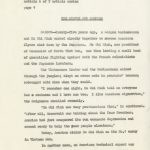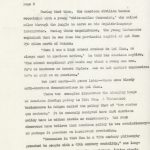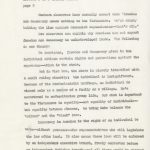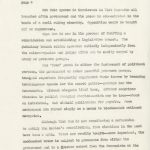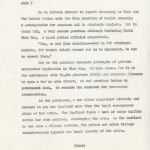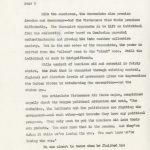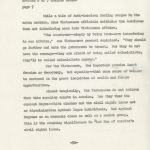1964, October, “The Status Quo Seekers”
deepe
article 6 of 7 article series
page 1
THE STATUS QUO SEEKERS
SAIGON–Twenty-five years ago, a Saigon businessman and Ho Chi Minh worked closely together to m escue American flyers shot down by the Japanese. Ho Chi Minh, now president of Communist of North Viet Nam, was then leading a small band of guerrillas fighting against both the French colonialists and the Japanese invaders.
The Vietnamese leader and the businessman walked through the jungles; slept on straw mats in peasants’ houses; scrounged cold rice when they could.
“I remember one night, Ho Chi Minh told me everyone had a weakness and I have one too. I like American cigarettes,” the Saigonese recalled recently.
“Ho Chi Minh was very pro-American then,” he continued. “After all, Roosevelt was talking about the Four Freedoms. America had just conquered its own economic depression and seemed ready to help the poor people elsewhere.”
Today, America claims Ho Chi Minh as its No. 1 enemy in Vietnam war.
In another case, an American technical expert was captured last year by the Communist guerrillas and held prisoner in the mountains for five months.
(More)
deepe
article 6 of 7 article series
page 2
During that time, the American civilian became acquainted with a young “white-collar Communist,” who walked miles through the jungle to serve as his English-language interpreter. During their acquaintance, the young Vietnamese explained that he was from the provincial capital of Qui Nhon 250 miles north of Saigon.
“When I was a high school student in Qui Nhon, we always went to American movies,” he told his American captive. “The nicest compliment you could say about a man was. He’s as handsome as Robert Taylor. And we had another expression: He’s as rich as an American.”
But last month–20 years later–there were bloody anti-American demonstrations in Qui Nhon.
These two examples illustrate the changing image of American foreign policy in Viet Nam. A Vietnamese businessman in Saigon called the policy that of “the status quo seekers.” It is commonly accepted here that American policy here is either static or reactionary. But some observers here believe that American policy is too revolutionary–or perhaps it preaches an irrelevant revolution.
“Communism in Viet Nam is a 19th century philosophy preached to people with a 13th century mentality,” one long-time American observer in Viet Namexplained. “We’re simply too far advanced for them.”
(More)
deepe
article 6 of 7 article series
page 3
Western observers here casually accept that “freedom and democracy means nothing to the Vietnamese. We’re simply holding the line against Communist expansionism–that’s all.”
Few observers can explain why American can not export freedom and democracy to underdeveloped lands. The following is one theory:
To Americans, freedom and democracy gives to the individual citizen certain rights and protections against the oppressor–which is the state.
But in Viet Nam, the state is closely identified with a small ruling minority; the individual is insignificant. Because of his Confucianistic heritage, an individual is viewed only as a member of a family or a village. He’s accustomed to authoritarian group life. But what is important to the Vietnamese is equality–not equality of individuals–but equality between classes, to bring into balance the “silver” and the “black” race.
Democracy in America is the right of an individual to vote–without pressure–for representatives who will legislate the law ofthe land. It also means these laws will be enforced by an independent executive branch, freely contested before an independent judician branch–and all three would be checked by a free press… The objective is to protect the individual.
(More)
deepe
article 6 of 7 article series
page 4
But this system is irrelevant in Viet Nam–for all branches ofthe government and the press is concentrated in the hands of a small ruling minority. Opposition would be bought off or suppressed.
Viet Nam is now in the process of drafting a constitution and establishing a legislative branch. The judiciary branch seldom operates entirely independently from the rulers–juries and judges alike can be easily swayed by money or pressure groups.
The “free” press is either the instrument of political parties, the government or other powerful pressure groups. Low-paid reporters frequently supplement their income by becoming intelligence agents for the secret police–perhaps for the Communists. Without adequate libel laws, editors sometimes threaten to publish damaging stories–which may be true–about an individual, but withold publication for payoffs. Some newspapers are formed simply as a means to blackmarket rationed newsprint.
Although Viet Nam is now considering a referendum to ratify the nation’s constitution, free elections in the past have been a myth. Votes are readily bought–more important, the uneducated voter is subject to pressures from either the government and to a greater extent from the Communists at the village level. When the Communist have the influence to collect taxes in the heart of Saigon, they also have the power to influence voters in district cities and villages supposedly [allied by the government.?]
deepe
article 6 of 7 article series
page 5
In an initial attempt to import democracy to Viet Nam the United States made the free election of hamlet councils a prerequisite for American aid to strategic hamlets. But in Quang Tri, a very secure province although bordering North Viet Nam a local police official complained.
“Yes, we had free elections–but in 416 strategic hamelts, 100 hamlet chiefs turned out to be Communist. We had to arrest them.”
Nor is the American economic principle of private enterprise applicable in Viet Nam, at this times. For it is the individual with 15,000 piastres ($200) who receives licenses to open a bar on main street, to cut precious lumber on government land, to receive the contract for government construction.
In the provinces, a war widow complained bitterly and refused to pay her landlord more than the legal one-quarter share of her crops. The landlord drove a herd of water buffalo across her rice paddies, destroying the crop. As the landlord he was also a village notable, the police and other village administrators ignored the legal appeals of the widow.
(More)
deepe
article 6 of 7 article series
page 6
Like the Americans, the Communists also promise freedom and democracy–but the Vietnamese view their promises differently. The Communist approache is to lift an individual from one collective order based on Confucian parental authoritarianism and placing him into another collective society. But in the new order of the Communists, the power is shifted from the “silver” race to the “black” race. Still the individual as such is insignificant.
While control of American aid and material is fairly strict, the fact that is channeled through existing central, regional and district levels of government gives the impression the United States is reinforcing the corruption–and the status quo.
One articulate Vietnamese Air Force major, complained angrily about the Saigon political situation and said, “The Catholics, the Buddhists and the politicians are fighting the government–and each other–not because they have any political programs. They only want to put the American aid into their own pockets. You must know that is the reason. And they’re doing it while we’re losing the war. You must know we’re losing the war.”
He was almost in tears when he finished his explanation in scissored English.
(More)
deepe
article 6 of 7 article series
page 7
While a tide of Anti-American feeling surges in the urban centers, some Vietnamese officials criticize the Americans forn not interfering more into Vietnamese affairs.
“The Americans–simply by being here–are interfering in our affairs,” one Vietnamese general explained. “They should go further and make the government be honest. But they do not have the courage–they are afraid of being called colonialists. They’ll be called colonialists anyway.”
For the Vietnamese, the important promise is not freedom or democracy, but equality–that some sense of balance be restored to the great inequities of wealth and future opportunities.
Almost tragically, the Vietnamese do not believe that this equality exists in America. For they view the current Negro–White clashes and the civil rights issue not as discrimination against Negro individuals, but against Negroes as an economic class as well as a racial group. This is the crushing significance in Viet Nam ofAmerica‘s civil rights issue.
Read Previous Article: 1964, October, “The Problems of Governing”
Read Next Article: 1964, October, “Military Revolutionary Government”

